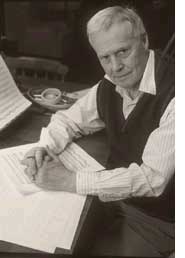Ned Rorem: Aftermath of September 11 at Wigmore Hall

Ned Rorem: Aftermath of September 11 at Wigmore Hall
A major song-cycle by Ned Rorem, America's leading song composer who celebrates his 85th birthday this year, receives its European premiere at the Wigmore Hall in London on Sunday 22 June.
Aftermath: Ten Songs on Love and War is scored for baritone solo with piano, violin and cello, and is performed in London by Thomas Meglioranza with Marisa Gupta, Hayley Wolfe and Nicholas Trygstad in a programme also including music by Barber, Gershwin and the European premiere of a song cycle by Aaron Jay Kernis. The concert is presented with the generous support of Cita and Irwin Stelzer and the Solti Foundation, and is sponsored by the US Embassy of London.
For full concert details Download a PDF brochure
To book tickets visit www.wigmore-hall.org.uk
Rorem's Aftermath is a personal and powerful response to the events of September 11th, through settings of texts by a wide range of poets well-known and obscure, from William Blake and Shakespeare to Richard Eberhardt and Jorge Luis Borges. In August 2001 the Ravinia Festival in Chicago had commissioned Rorem to write a new song cycle. A few weeks later came the attacks in New York. The composer – a longtime New Yorker and a Quaker whose pacifist beliefs are vividly expressed in works such as War Scenes – was moved to respond, writing a cycle of ten “songs of war and love” and titling it Aftermath. The song cycle was unveiled at the Ravinia Festival in Chicago in July 2002, performed by baritone Kevin Greenlaw with Hsing-ay Hsu (piano), Lisa Shihoten (violin), and Amy Sue Barston (cello).
In his preface to the work, Rorem writes, “In the wake of the September 11th shock, I asked what a thousand other composers must have asked: What is the point of music now? But it soon grew clear that music was the only point. Indeed, the future will judge us, as it always judges the past, by our art more than by our armies.”
“Few musical responses to the events of September 11 are likely to achieve lasting repertory status; Rorem’s Aftermath deserves to do so….This is music drawn from the abyss of despair, music roused to anger by the dry and hideous drumbeat of battle, music that scurries in panicky circles of strings and piano as it evokes an aerial barrage. Grief and desolation give way to quiet consolation in the final song, a heartbreakingly beautiful setting of Muriel Rukeyser’s ‘Then.’”
Chicago Tribune
“A work of laserlike precision, a merciless honing of music and text in songs that cut to the emotional heart of love and loss.”
Chicago Sun-Times
> Further information on Work: Aftermath
Photo: © Robert Benchley
